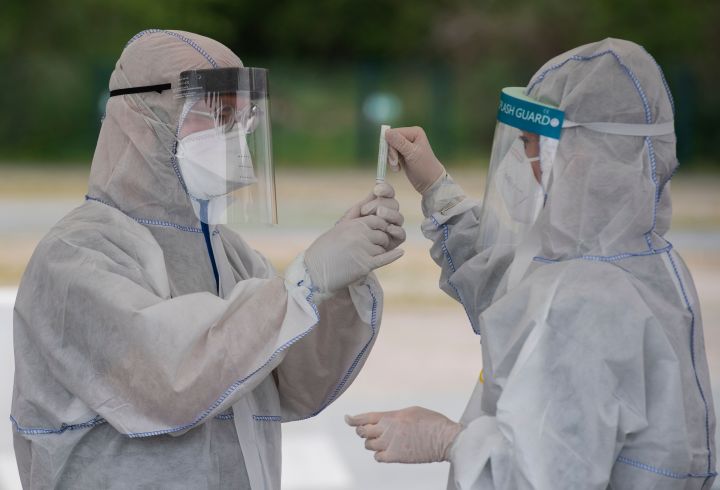Twice a week, every week, students at the University of Illinois are asked to spit into a cup.

It’s a new kind of test for coronavirus — one that replaces sticking a swab up your nose for a simpler saliva sample.
The test has recently received emergency authorization by the U.S. FDA, one of several saliva tests to receive that approval. Another saliva test, developed by researchers at the Yale School of Public Health, received authorization after it was tested on players in the NBA.
So far, while Health Canada has received applications, it has not approved any coronavirus saliva tests for use in Canada.
“Health Canada will consider the evidence provided by manufacturers in deciding whether to authorize a test that uses saliva samples,” a department spokesperson wrote in a statement. “Manufacturers would have to demonstrate that the virus or antibodies to the virus can be reliably and accurately detected in the saliva sample. At this time, Health Canada has not authorized the use of saliva samples with any authorized testing device.”
While the data is still new, the Yale test does seem to work, said Jason Kindrachuk, who holds a Canada Research Chair in emerging viruses at the University of Manitoba.
“That one was only slightly less sensitive than what the traditional nasal swab test was,” he said. The research team has published its results online, but they have not been peer-reviewed. It’s a trade-off, Kindrachuk thinks. It might be worth using a slightly less sensitive test, if it can be done more often.

“With saliva being quick and easy to collect, we realized it could be a game-changer in COVID-19 diagnostics,” said Anne Wyllie, assistant professor and associate research scientist at Yale School of Public Health, in a press release.

Get weekly health news
FDA commissioner Dr. Stephen Hahn called the Yale test, called SalivaDirect, “groundbreaking,” in a statement.
Saliva tests offer several advantages over the usual nasopharyngeal swab test, currently being used in Canada, Kindrachuk said.
First, the sampling and testing equipment might be easier to get. Early on in the pandemic, Canada had problems getting enough tests because of the high demand for the test kit pieces, like the swabs and chemicals, he said.
“The problem is, we were all trying to borrow from the same supply chain,” he said.
While this is less of an issue than it once was, having alternative tests is a good thing, he thinks. Health Canada says that while it hasn’t approved a saliva test yet, it has approved several alternate swab tests.

The saliva test is also often faster than the current one, Kindrachuk said. While it does still need to be analyzed in a lab, it’s a little easier. In the Yale test, “You essentially have cut out a fairly time-consuming part of the process where you actually have to get the nucleic acid out of the saliva,” he said.
The University of Illinois said in a statement that it expects most student test results to arrive within just five hours.
Finally, Kindrachuk said, spitting into a cup is a much more pleasant experience than having someone stick a swab up your nose, and people might be more inclined to get tested if it’s so easy to do.
“I think everybody that has done the nasal swab so far can attest to the fact that they’re not overly comfortable. So you probably are going to have an easier time with the uptake.”

This kind of testing could be especially useful for university campuses, where students might live and congregate together, and maybe even other educational settings, he said. If an infected person can be identified quickly, they can be placed into quarantine before they infect many others, he said.
Kindrachuk expects we will have saliva tests for coronavirus in Canada soon, though he appreciates that Health Canada is being cautious and making sure that they work well before allowing them to be generally used.
“Ultimately, I think we will see one approved or multiple approved in Canada in the very near future,” he said.
“We’re all trying to figure out new ways of doing things better, faster and more reliably.”
— with files from Reuters



Comments
Want to discuss? Please read our Commenting Policy first.